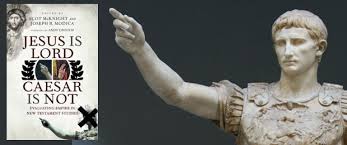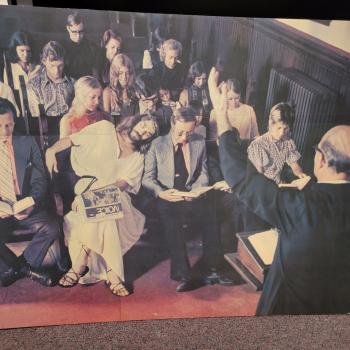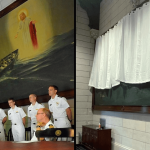In the past several decades, one of the major trends in the evaluation of the NT has been the study of its contents in relationship to the rising tide of the Emperor cult during the first century A.D. On the surface of things, such a comparison seems promising because Jesus and one or another of the Emperors were the only actual historical figures of the era who came to be worshiped only shortly after their deaths, or in the case of some of the Emperors, even before their deaths. As is true with a lot of trends in the study of the NT, they become popular, then some of the results are taken as givens, or almost so, then there is push back and critique of the trend. The book Jesus is Lord, Caesar is Not edited by Scot McKnight and Joseph Modica falls largely into the latter category, though with some telling admissions about Emperor and Empire crtique for example in the Book of Revelation. In the next several posts we will be critiquing the book, and Scot McKnight has agreed to respond to a few questions about the book and what prompted.
Our intent is to work through the essays in this book, mostly by younger scholars, some of them considerably younger than yours truly (but then I’m in my 60s and most scholars are now younger than me), and see what fresh light they shed on the subject. It does need to be said with some dismay that various of the conservative Christian scholars (I’m not referring to the ones who wrote this book!) who have just dismissed Empire criticism were mostly in no position to do so, because they were not experts in Roman history, did not study the classics, in some cases couldn’t even read Latin, and have not really interacted with classics scholars who do know lots about the growth and development of the Imperial Cult. Fortunately, this collection of essays avoids that sort of pitfall and too easy dismissal of the trend.
The book begins with a helpful Foreword, and assessment by Andy Crouch, the new head editor of CT, who himself has written an excellent recent book about power, including political power and its uses and abuses entitled Playing God, which I commend to you. I am going to save his overall assessment of the book in focus in these posts until the end of the discussion, as I think his assessment is correct, and a needed corrective in various ways. In this post, let me state a few things that ought to go without saying, but apparently need to be said.
1) the early Christians were monotheists, indeed the earliest ones were all Jewish monotheists and as such had always been opposed to polytheism, the worship of any supposed deity, mythological or human, that was not the Biblical God. This characterizes not just the NT, but the OT as well. This would of course obviously include the Emperor cult. The question then becomes did the writers of the NT single out the Emperor cult for special criticism as a form of idolatry and if so, in what ways?
2) the early Christians were also, of course opposed to the ‘abuse’ of power by any leader or ruler, and opposed to corruption in high places of various sorts. This critique can be found in either testament as well. The critique of abuse of power however is not the same thing as the critique of any use of power, any sort of hierarchy, any sort of government or governmental control. It just isn’t. The old Latin dictum applies— ‘abusus non tollit usum’– the abuse of a privilege does not rule out its proper use.
3) Though this may be a little more controversial, it ought not to be. Early Jews and early Christians believed in personal supernatural evil– both in the person of Satan and in the case of demons. This includes the writers of the NT. A critique of these principalities and powers is not necessarily the same thing as a critique of governments and rulers, though there are times and places where there seems to be demonic influence or control over a governing official or a particular fallen kind of governmental structure— for instance during the Third Reich. Did the writers of the NT think that all existing human governing structures, including the Roman ones were by their very nature always inherently demonic in character? The evidence does not support such a sweeping conclusion. Indeed, as we shall see, there is considerable evidence against such a view in the NT. What a modern scholar may believe about demons is in fact irrelevant if we are asking what the NT writers meant when they wrote about these things.
There will be more to say along these lines in due course, but this is a good start.

















